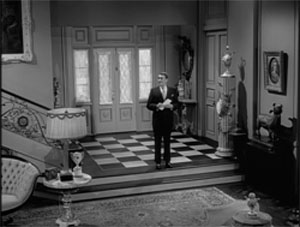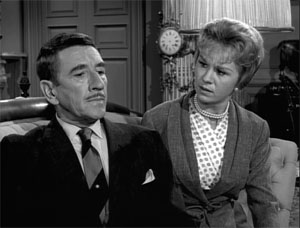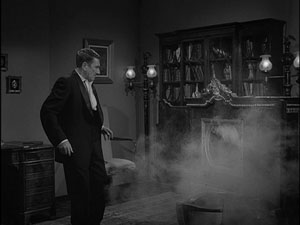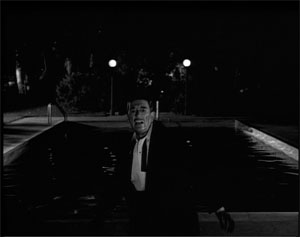Anti-Technological Fantasia: Revisiting "A Thing About Machines"
by Michael Martin DeSapioTechnology, for better or for worse, dominates our lives. Rod Serling, ever the humanist, frequently dealt in his Twilight Zone scripts with modern technology's dehumanizing and destructive side-effects. This theme takes center stage in Serling's second-season episode "A Thing About Machines." Although it rarely shows up on lists of favorite episodes - and indeed is frequently dismissed out of hand for its supposedly "hokey" special effects - "Machines" merits a second look. It is an acerbic and psychologically perceptive piece, a mid-twentieth century satire that shows no danger of becoming dated, thanks to our ever increasing dependence on technology. Its flaws - which we will discuss by and by - are more than compensated by witty language, a heady dose of visual surrealism, and an impressive starring performance by British-born actor Richard Haydn.

Haydn plays Bartlett Finchley, a sophisticate who writes "very special and very precious things for gourmet magazines and the like," according to Serling's opening narration. Finchley embodies the character types of snob, misanthrope, and luddite (Serling tells us that he was "born either too late or too early in the century"). He abhors the modern world and especially its machines - many of which nevertheless occupy his home, including a television, radio, telephone, typewriter, and electric razor. The first moments of the episode establish Finchley's hauteur and his isolation from humanity. As he pulls up to his house in an old-fashioned Bentley (significantly passing his swimming pool), he looks at the television repairman's truck parked in his driveway. He checks his mailbox - empty. He goes inside and, in a long shot, we see his impeccably dressed figure dwarfed by his affectedly genteel home, filled with art and artifacts of the past. He proceeds to berate the repairman, whom he accuses of being a scam artist out to bilk him ("I presume I'm going to be dunned again for three times the worth of the blasted thing"). Shortly after the repairman leaves, we see Finchley smash an antique porcelain clock whose ringing was annoying him. Seemingly indestructible, the clock continues to ring even as it lies in pieces on the ground; it is a signal that Finchley's time is up.
"Why don't they work properly?" the repairman asks Finchley in reference to his machines; "offhand I'd say it's because you don't treat 'em properly." This goes to the heart of Finchley's problem, for "A Thing About Machines" is really about a man who has a serious thing about people. In the next scene we see him lashing out at his secretary, Miss Edith Rogers (easily his equal in sharp-tongued repartee), because the typewriter causes her to turn out an inadequate rate of work. ("Thomas Jefferson wrote the entire Declaration of Independence with a feather quill, and it took him only half a day"; to which she replies,"Why don't you hire Mr. Jefferson?") Accordingly, Miss Rogers quits: "You get yourself another girl; one with three arms and with roughly the same sensitivity as an alligator; then you can work together till death do you part."

At this point the mask drops and Finchley's vulnerable side appears. He is "desperately tired," not having slept in four nights, and is afraid to be alone in the house. Strange things have been happening: appliances have been turning on by themselves, and while he was steering his car into the driveway it veered of its own accord and hit the side of the garage - a "conspiracy" on the part of "Frankensteinian monsters" to move him out. Miss Rogers' suggestion that Finchley see a doctor is met with more invective against the modern world: "A doctor! The universal panacea of the dreamless modern idiot! If you're depressed, see a doctor. If you're happy, see a doctor!" Miss Rogers declines Finchley's entreaties to have dinner with him or stay with him for a while.
"Mr. Finchley, in this conspiracy you speak of - this mortal combat between you and the appliances - I hope you lose."
Finchley in turn leaves no doubt that he sees people as machines that must do his bidding:
"I will not be intimidated by machines; so it follows that no empty-headed little female with a mechanical face can do anything to me either!"
Having been deserted by Miss Rogers, Finchley next phones a couple of women acquaintances in search of a date. The first has other plans; the second is getting married. Finchley has struck out again. The telephone is the bearer of the bad news, and hence becomes the scapegoat for Finchley's frustrations. It also emphasizes his isolation; the women must be accessed remotely, and he must suffer rejection remotely, through a machine. He yanks the telephone chord out of the wall; yet the phone continues to emit exclamations of "Get out of here, Finchley!"

Finchley's car, the instrument of his eventual demise, now comes into play. Hearing a siren, Finchley goes outside to find a police officer and a crowd gathered around his driveway. It turns out the car rolled down the driveway and almost hit a small boy. The officer urges Finchley to have the emergency brake checked. With supercilious disdain, Finchley tells the "goggling" strangers (including a boy mechanically licking a lollipop) to leave his property. He does not check the emergency brake, but goes back inside and drinks a full bottle of hard liquor. He falls asleep, marking the point of no return and setting the stage for the episode's denouement.
At this point we might observe that "A Thing About Machines" leaves us with a number of unanswered questions. How did Finchley's technophobia come about in the first place? If he hates machines so much, why does he have so many of them in his house - including ones he could easily do without? How does a lovely antique clock inspire the same revulsion in him as an ordinary television set? These are all symptoms of a somewhat undernourished plot and unclear character motivation, two of the episode's flaws.
Ultimately, though, "Machines" is not to be picked apart for logical consistency but to be enjoyed for its black humor and visual fantasy. As the various machines in Finchley's house come to life and turn on their owner, we are treated to a number of darkly funny images straight out of a late-night bad dream. The electric razor which, in a very convincing and well-photographed special effect, actually leaves his hand and slithers cobra-like through the air is the most memorable; but almost as surreal is the television set which spontaneously switches on, showing a flamenco dancer interrupting her castanet dance to say "Get out of here, Finchley!" (The typewriter types the same message by itself.) These surreal moments underline the seemingly random nature of modern media, constantly intruding into our lives. In a delightful effect, Serling appears on the television set to deliver his opening narration. And the episode's first act ends with the television and typewriter "mocking" him in rhythm.
The denouement of "Machines," in which Finchley's car chases him to his death, adds the perfect touch of sinister daredevilry. With its headlights glaring like eyes, the car pursues its hapless owner around his stately suburban estate at night. The fact that nobody in the entire neighborhood is roused by the noise to come out and see what is going on emphasizes once again Finchley's isolation. The car eventually pushes him into his swimming pool and a silent, wordless death. (We can surmise that Finchley couldn't swim, and that the pool functioned only as a status symbol.) The scene dissolves into an ambulance the next morning, where Finchley's dead body lies on a stretcher and his car still sits nearby. A police officer wonders aloud to the hospital intern why Finchley's body sank to the bottom of the pool, as bodies usually float. This mysterious detail, the source of much discussion among fans, perhaps suggests the degree to which Finchley was weighted down emotionally.

Given the cruel fate destined for him, it was tempting for Serling to have made us detest Bartlett Finchley. Yet he is not utterly loathsome, and Richard Haydn's believable performance gives the character a measure of human sympathy. A man dedicated to a high form of culture, Finchley is obviously well educated and has surrounded himself with the best life has to offer; his tragedy is that he has no one to share it with, for he is a curmudgeon who has never learned how to deal with people. Serling tells us in his narration that he has "few friends, only devotees and adherents to the cause of tart sophistry." Being a critic is not simply Finchley's profession, but his whole state of being. He is a person dedicated to poking holes in everyone and everything around him. Having successfully alienated humankind, he becomes prey to the heartless machines which destroy him.
In his closing narration, Serling leaves it up to us to decide whether what happened to Finchley was real or an alcohol-induced nightmare. As always, The Twilight Zone is rich enough to bear multiple meanings, suiting the disposition and preference of the viewer:
"...It could just be that Mr. Bartlett Finchley succumbed from a heart attack and a set of delusions. It could just be that he was tormented by an imagination as sharp as his wit and as pointed as his dislikes. But as perceived by those attending, this is one explanation that has left the premises with the deceased. Look for it filed under "M" for Machines - in The Twilight Zone."
Time has shown Serling to have been a prescient social observer. Today, technology dominates our lives even more than in 1960; to television and automobiles we have added a hundred electronic devices which we depend on for information and amusement. Mechanization has not only destroyed jobs but transformed our very way of life, rendering us denatured and socially atomized. A half century after the end of its run, The Twilight Zone continues to hold a mirror up to us and our world, all the while delighting us with whimsical entertainment on the order of "A Thing About Machines."
To contact Michael, send email to michaelmartind@gmail.com
Check out Michael's screenplay,
